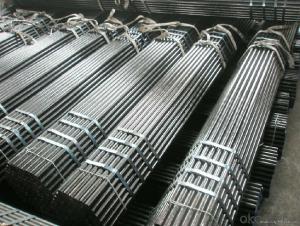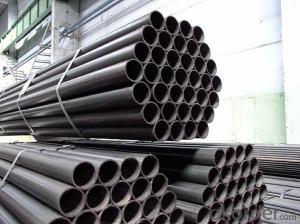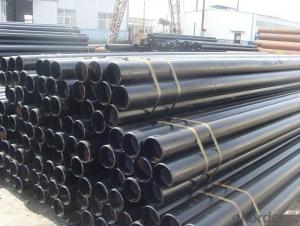Seamless Steel Pipes from Okorder ASTMA53/106
- Loading Port:
- Tianjin
- Payment Terms:
- TT OR LC
- Min Order Qty:
- 100 m.t.
- Supply Capability:
- 3000 m.t./month
OKorder Service Pledge
OKorder Financial Service
You Might Also Like
Product Description:
1、Structure of Seamless Steel Pipes ASTMA53/106 GR.B Description:
A large amount of Seamless Steel Pipes are offered to the clients at cost effective rates. These pipes are extremely durable, resistant to corrosion and have high tensile strength. Our pipes are used in nuclear plants, power plants, refineries and construction industry across the country. Furthermore, we are capable of providing these seamless pipes to the clients in bulk quantity.
2、Main Features of the Seamless Steel Pipe:
• High manufacturing accuracy
• High strength
• Small inertia resistance
• Strong heat dissipation ability
• Good visual effect
• Reasonable price
3、Seamless Steel Pipes Images:
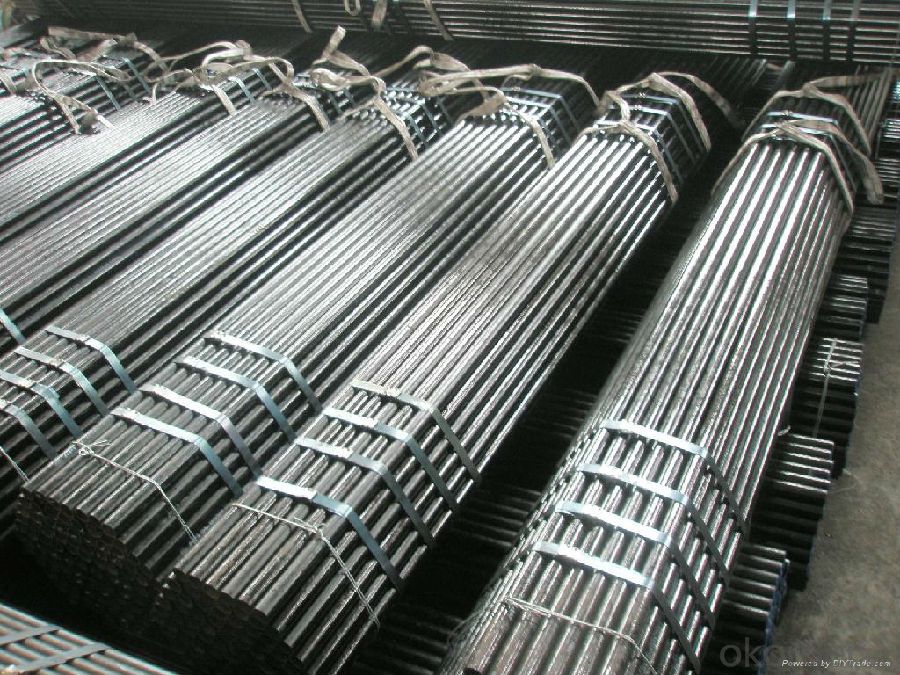
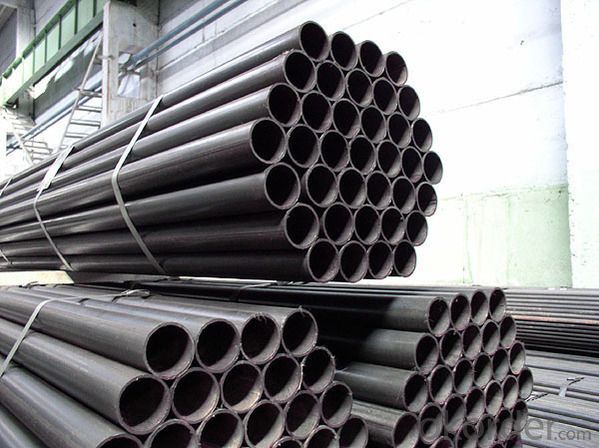
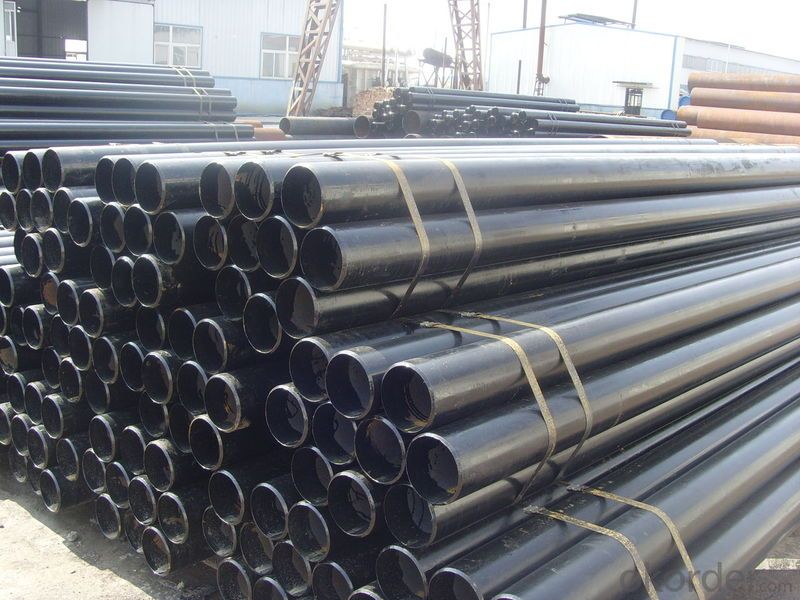
Packaging & Delivery
| Packaging Details: | beveled, plastic caps covered two ends, black painting, marking on each pipe, tied in bundles by steel strip for the convenience of long distance transportation. |
Delivery Detail: | Pipes in stock , immediately; If produce, around 15 days |
4、 Seamless steel pipe Specification:
Standard:
GB, DIN, ASTM, API
GB/T8162, GB/T8163, GB/T 3087, GB/T5310, DIN 1626, DIN 17175, ASTM A106-2006, ASTM A53-2007, ASTM A210-1996, ASTM A333-2005, ASTM A179-1990, ANSI B36.10M-2004, ASME B36.10M-2004, API 5CT, API 5LGrade:
10#-45#, Cr-Mo alloy, A53-A369, API J55-API P110, ST35-ST52, Q195-Q345
10#, 20#, 45#, 30CrMo, A53(A,B), A106(B,C), A210, A178-C, API J55, API K55, API N80, St37, St42, St52.4, Q345Thickness:
0.8 - 60 mm
Section Shape:
Round
Outer Diameter:
5- 920 mm
Secondary Or Not:
Non-secondary
Application:
Oil Pipe
Technique:
Hot Rolled
Certification:
ISO, API
Surface Treatment:
COATING: OILED
Special Pipe:
API Pipe
Alloy Or Not:
Non-alloy
Carbon Steel Seamless Pipes API 5L GR.B/ ASTMA53/A106 GR.B
Size: | od245mm*wt10mm |
Brand Name: | XPY |
Outside diameter: | 5-920mm |
Wall thickness: | 0.8-60mm |
Length: | random or fixed |
Price Terms: | FOB, CNF, CIF |
Shipment: | in containers or in bulk |
Standard: | ASTMA53, A106 GR.B; ASTM178-C; ASTMA1045; ASTMA283-D; A210-C; API5L ; API5CT, St33, St52, St42, St45-8, DIN1629, DIN17175; BS, JIS and so on. |
CHINESE STANDARD | AMERICAN STANDARD | GERMAN STANDARD |
20# | ASTMA106-B | St45-8 DIN17175 |
ASTMA53-B | St42-2 DIN1626 | |
ASTM178-C | St45-4 DIN1629 | |
45# | ASTMA1045 | CK45 |
16Mn | A210-C | St52.4 DIN1629 |
St52 DIN1629 | ||
37Mn5 | J55 | |
Q235 | ASTMA283-D | St33 |
5、 FAQ of Seemless Steel Pipes:
①How is the quality of your products?
Our products are manufactured strictly according to national and internaional standard, and we take a test
on every pipe before delivered out. If you want see our quality certifications and all kinds of testing report, please just ask us for it.
Guaranteed: If products’ quality don’t accord to discription as we give or the promise before you place order, we promise 100% refund.
②How about price?
Yes, we are factory and be able to give you lowest price below market one, and we have a policy that “ for saving time and absolutely honest business attitude, we quote as lowest as possible for any customer, and discount can be given according to quantity”,if you like bargain and factory price is not low enough as you think, just don’t waste your time.Please trust the quotation we would give you, it is professional one.
③Why should you chose us?
Chose happens because of quality, then price, We can give you both.Additionally, we can also offer professional products inquiry, products knowledge train(for agents), smooth goods delivery, exellent customer solution proposals.Our service formula: good quality+good price+good service=customer’s trust
SGS test is available, customer inspection before shipping is welcome, third party inspection is no problem.
Any question, pls feel free to contact us !
- Q:What are the advantages of using steel pipes in the manufacturing of storage tanks?
- There are several advantages of using steel pipes in the manufacturing of storage tanks. Firstly, steel pipes are known for their strength and durability, making them suitable for holding large volumes of liquids or gases. They can withstand high pressure and extreme weather conditions, ensuring the longevity of the storage tank. Additionally, steel pipes are resistant to corrosion, which is crucial for preventing leaks or contamination of the stored materials. Moreover, steel pipes can be easily welded, allowing for efficient and precise construction of storage tanks. Finally, steel pipes have a high recyclability rate, making them an environmentally friendly choice for storage tank manufacturing.
- Q:How are steel pipes used in the wastewater treatment industry?
- Steel pipes are commonly used in the wastewater treatment industry for various purposes, including the transportation of wastewater from one area to another, the distribution of treated water to different locations, and the construction of infrastructure such as pumping stations and treatment plants. Due to their durability, resistance to corrosion, and ability to withstand high pressure, steel pipes are essential components in the efficient and reliable operation of wastewater treatment systems.
- Q:What is the difference between steel pipes and plastic pipes?
- Steel pipes are made from a strong and durable metal, while plastic pipes are made from synthetic materials like PVC or polyethylene. Steel pipes are typically used for high-pressure applications and in areas where strength and durability are key factors. On the other hand, plastic pipes are more lightweight, corrosion-resistant, and easier to install. They are commonly used for low-pressure applications and in areas where chemical resistance is important.
- Q:What are the common applications of galvanized steel pipes?
- Galvanized steel pipes are commonly used in various industries and applications such as plumbing, water supply systems, gas pipelines, electrical conduits, construction projects, fencing, and outdoor structures. The galvanization process adds a protective zinc coating to the steel, making it resistant to corrosion and extending its lifespan, making it ideal for applications requiring durability and longevity.
- Q:How are steel pipes insulated against heat loss?
- Steel pipes are commonly insulated against heat loss by applying a layer of thermal insulation material around the pipes. This insulation material can be in the form of foam, mineral wool, or fiberglass. The insulation is typically wrapped tightly around the pipes and secured with adhesive or tape to ensure proper coverage. This insulation layer helps to reduce heat transfer through the pipe walls, thereby minimizing heat loss. Additionally, the insulation may be covered with a protective jacket or coating to provide further protection against external elements.
- Q:Can steel pipes be used for hydronic heating systems?
- Yes, steel pipes can be used for hydronic heating systems. Steel pipes are commonly used in hydronic heating systems due to their durability, high temperature resistance, and ability to handle high pressure. They are suitable for both residential and commercial applications and can efficiently transport hot water or steam throughout the system.
- Q:How are steel pipes protected against soil movement or settlement?
- Various methods can be employed to safeguard steel pipes against soil movement or settlement. One prevalent approach involves the utilization of protective coatings on the pipes, which act as a barrier between the steel and the soil. By preventing direct contact and reducing the chance of corrosion, these coatings offer effective protection. Epoxy, polyethylene, and zinc are among the coatings commonly employed for this purpose. Another method entails the implementation of cathodic protection. This technique involves the installation of sacrificial anodes along the pipeline. These anodes corrode instead of the steel pipes, thus shielding them from potential harm caused by soil movement or settlement. Furthermore, ensuring proper design and installation techniques is crucial for protecting steel pipes in these scenarios. Engineers must take into account factors such as soil composition, slope stability, and the likelihood of ground movement when designing the pipeline route. Additionally, employing appropriate trenching and bedding techniques guarantees adequate support and protection against settlement. Regular inspection and maintenance play a crucial role in protecting steel pipes against soil movement or settlement. By monitoring the condition of the pipeline, including the protective coatings and cathodic protection systems, potential issues can be identified promptly, allowing for timely repairs or replacements. In conclusion, a combination of protective coatings, cathodic protection, proper design and installation techniques, and regular maintenance effectively safeguards steel pipes from soil movement or settlement.
- Q:Can steel pipes be used in marine environments?
- Yes, steel pipes can be used in marine environments. Steel is a commonly used material in marine structures due to its strength, durability, and resistance to corrosion. However, it is important to use the appropriate grade of steel and apply protective coatings to enhance its resistance to seawater corrosion. Regular maintenance and inspections are also necessary to ensure the longevity and performance of steel pipes in marine environments.
- Q:How are steel pipes classified based on their diameter?
- Steel pipes are classified based on their diameter by categorizing them into different size ranges, such as small diameter pipes, medium diameter pipes, and large diameter pipes.
- Q:Why should the weak electricity be pre buried with galvanized steel pipe?
- Galvanized steel is widely used in construction, machinery, coal, chemical industry, railway vehicles, automobile industry, highway, bridge, container, sports facilities, agricultural machinery, petroleum machinery, prospecting machinery and other manufacturing industries.
1. Manufacturer Overview |
|
|---|---|
| Location | |
| Year Established | |
| Annual Output Value | |
| Main Markets | |
| Company Certifications | |
2. Manufacturer Certificates |
|
|---|---|
| a) Certification Name | |
| Range | |
| Reference | |
| Validity Period | |
3. Manufacturer Capability |
|
|---|---|
| a)Trade Capacity | |
| Nearest Port | |
| Export Percentage | |
| No.of Employees in Trade Department | |
| Language Spoken: | |
| b)Factory Information | |
| Factory Size: | |
| No. of Production Lines | |
| Contract Manufacturing | |
| Product Price Range | |
Send your message to us
Seamless Steel Pipes from Okorder ASTMA53/106
- Loading Port:
- Tianjin
- Payment Terms:
- TT OR LC
- Min Order Qty:
- 100 m.t.
- Supply Capability:
- 3000 m.t./month
OKorder Service Pledge
OKorder Financial Service
Similar products
New products
Hot products
Related keywords
